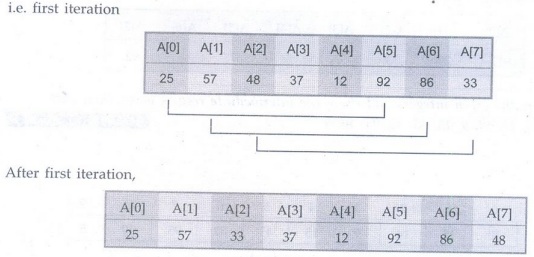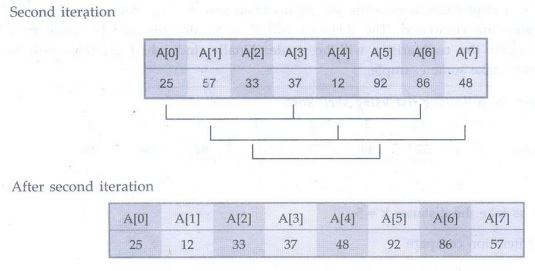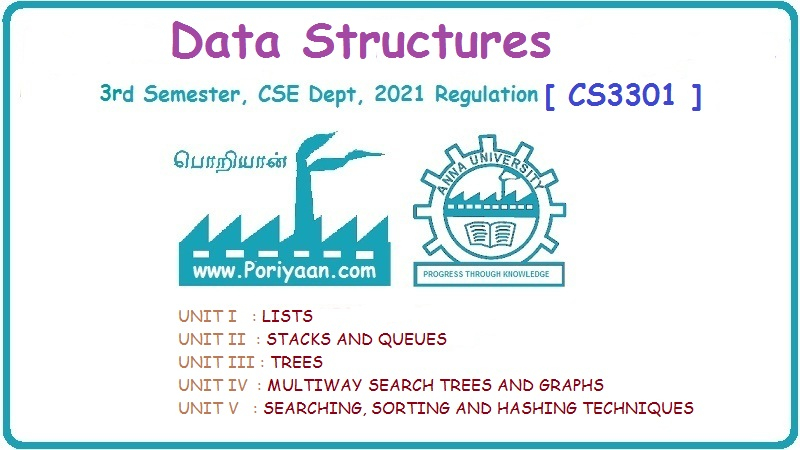Data Structure: Unit V (a): Searching and Sorting
Shell Sort
Example Operations, Algorithm with Example C Programs | Data Structure
This method is a improvement over the simple insertion sort. In this method the elements at fixed distance are compared.
Shell Sort
This
method is a improvement over the simple insertion sort. In this method the
elements at fixed distance are compared. The distance will then be decremented
by some fixed amount and again the comparison will be made. Finally, individual
elements will be compared. Let us take some example.
Ex. 6.6.1: Sort the following list using shell
sort.

Sol. :
Step 1:
Let us
take the distance k = 5
So in
the first iteration compare
(A [0],
A[5])
(A [1],
A [(6])
(A [2],
A[7])
(A[3])
(A[4])

Step 2:
Initially
k was 5. Take some d and decrement k by d. Let us take d = 2
k = k – d
i.e. k = 5-2 = 3
So now
compare
(A[0],
A[3], A[6]), (A[1], A[4], A[7])
(A[2],
A[5])

Step 3: Now k = k d k = 3-2 = 1
So now
compare
(A[0],
A[1], A[2], A[3], A[4], A[5], A[6], A[7])
This
sorting is then done by simple insertion sort. Because simple insertion sort is
highly efficient on sorted file. So we get

Ex. 6.6.2 Sort the given integers and show the
intermediate results using shell sort
35, 12, 14, 9, 15, 45, 32, 95, 40, 5
Sol. :
Step 1:

We will
assume distance k = 5
Hence we
will compare
(A[0],
A[5]) i.e. 30 and 45
(A[1], A[6]) i.e. 12
and 32
(A[2],
A[7]) i.e. 14 and 95
(A[3],
A[8]) i.e. 9 and 40
(A[4],
A[9]) i.e. 15 and 5
Exchange
The
array will be

Step 2: Take some d. Let d = 2.
Then set k = k-d. k = 5-2 = 3
So now
we will compare
(A[0], A[3],
A[6], A[9]) i.e. 30, 9, 32, 15
(A[1],
A[4], A[7]) i.e. 12, 5, 95
(A[2],
A[5], A[8]) i.e. 14, 45, 40
The
array then becomes as follows -

Step 3:
Now k = k-d i.e. k = 3- 2 = 1
Now we
will simply compare each element with every other element. The sorted list
which we will get is

Ex. 6.6.3 C Program for sorting elements using
shell sort.
Sol. :
/*************************************************************
Program
for sorting the list of elements using shell sort
*************************************************************/
#include<stdio.h>
#include<stdlib.h>
#include<conio.h>
#define
MAX 10
int
main(void)
{
void
shellsort(int a[], int n);
void
Display(int a[], int n);
int
a[MAX];
int i,n;
clrscr();
printf("\n\t
Program for Shell Sort");
printf("\n
Enter total number of elements in an array ");
scanf("%d",
&n);
printf("\n
Enter some elements in array\n");
for(i=0;i<n;i++)
scanf("%d",&a[i]);
printf("\nBefore
sorting ");
Display(a,n);
printf("\n");
printf("\nAfter
sorting ");
shellsort(a,n);
Display(a,n);
getch();
return
0;
}
void
Display(int a[], int n)
{
int i;
for(i=0;i<n;i++)
{
printf("%d",
a[i]);
}
}
void
shellsort(int a[], int n)
{
int
i,j,d,k,value;
d=(n+1)/2;
for(i=d;i>=1;i=i/2)
{
for(j=i;j<=n-1;j++)
{
value=a[j];
k=j-i;
while(k>=0
&& value <a[k])
{
a[k+i]=a[k];
k=k-i;
}
a[k+i]=
value;
}
}
}
Output
Program
for Shell Sort
Enter
total number of elements in an array 10
Enter
some elements in array
10
9
8
7
6
5
4
3
2
1
Before sorting
10 9 8 7 6 5 4 3 2 1
After
sorting 1 2 3 4 5 6 7 8 9 10
Review Question
1. State and explain the shell sort.
State and explain the algorithm for shell sort. Sort the elements using shell
sort.
Data Structure: Unit V (a): Searching and Sorting : Tag: : Example Operations, Algorithm with Example C Programs | Data Structure - Shell Sort
Related Topics
Related Subjects
Data Structure
CS3301 3rd Semester CSE Dept | 2021 Regulation | 3rd Semester CSE Dept 2021 Regulation
